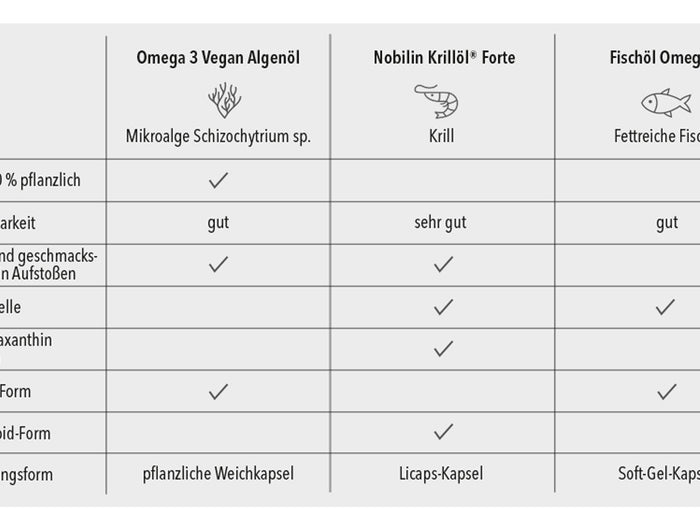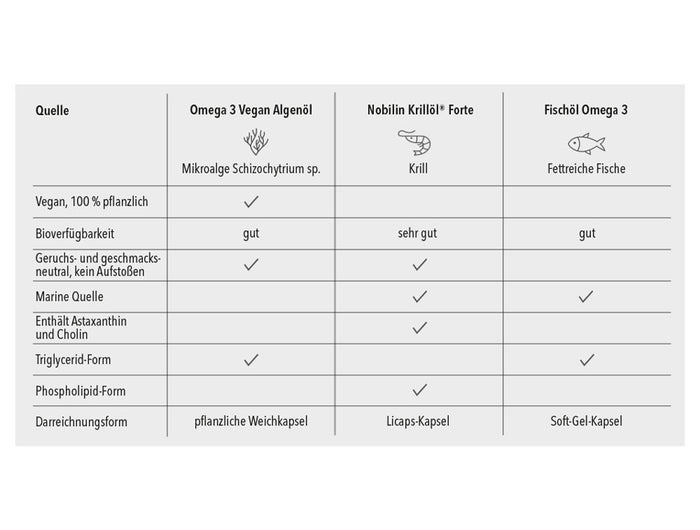
Veganes Algenöl von Medicom
Die rein pflanzliche Omega-3-Kraft
- DHA- und EPA-reiches Öl aus der Mikroalge Schizochytrium sp.
- Eicosapentaensäure (EPA) und Docosahexaensäure (DHA) tragen zur normalen Herzfunktion bei*
- DHA trägt zur Aufrechterhaltung der normalen Sehkraft bei**
- DHA trägt zum Erhalt der normalen Gehirnfunktion bei**
- Reines Algenöl
- Patentiertes, ressourcenschonendes Herstellungsverfahren
- Höchste Reinheit
- Hohe Frische, niedriger Oxidationsgrad, TOTOX-Wert 4
- Wiederverwendbare Dose auf Zuckerrohrbasis
- 1.000 mg Omega-3-Algenöl pro Tagesdosis
- davon 300 mg DHA und 150 mg EPA
- 100% vegan
Die positiven Wirkungen stellen sich bei einer täglichen Aufnahme von 250 mg EPA und DHA* bzw. 250 mg DHA** ein.

Beste pflanzliche Omega-3-Qualität
Mit Original life’s®OMEGA Algenöl von DSM
Die Vorteile von life’s®OMEGA auf einen Blick:
- 100% vegan – geeignet für eine vegane Ernährungsweise
- Ressoucenschonend: Kultivierung außerhalb des Meeres – so werden Bestände im Meer geschützt
- Höchste Reinheit – keine Verunreinigungen durch Schwermetalle oder Pestizide aufgrund der speziellen Kultivierung außerhalb des Meeres
- Jodfrei aufgrund spezieller Kultivierung (Meeresalgen enthalten Jod), geeignet für Menschen mit Jodempfindlichkeit
- 100% natürlich: life’s®OMEGA steht für die beste Algenöl-Qualität auf dem Markt
- Ohne Gentechnik und in natürlicher Triglycerid-Form
- Schutz der empfindlichen Omega-3-Fettsäuren vor Oxidation durch natürliches Vitamin E
Warum ist die Ergänzung mit Omega 3 Vegan Algenöl sinnvoll?
Für alle, die eine rein pflanzliche vegane Alternative zu marinen Omega-3-Quellen, wie Fischöl oder Krillöl, suchen
- Für Menschen, die sich vegan oder vegetarisch ernähren
- Für alle, die die neuste Revolution der pflanzlichen Omega-3-Versorgung kennenlernen wollen
- Für alle, die selten oder gar keinen Fisch essen oder mögen
- Für alle, die eine kleine, angenehm zu schluckende Weichkapsel bevorzugen
- Für Personen, die eine Fisch- und/oder Schalentierallergie haben
Das macht es so besonders: Algenöl ist die einzige pflanzliche Quelle, welche die Omega-3-Fettsäuren Eicosapentaensäure (EPA) und Docosahexaensäure (DHA) in direkter Form bietet. Omega 3 Vegan Algenöl (Link zu Produkt) von Medicom - hergestellt in der Schweiz - mit dem Markenrohstoff life’s®OMEGA bietet die ideale Alternative zu marinen Omega-3-Präparaten.
Kann der Bedarf an EPA & DHA über die Ernährung gedeckt werden?
Der Bedarf an EPA und DHA kann über die Ernährung gedeckt werden, vor allem durch den Verzehr von Omega-3-reichen Fischarten wie Lachs, Thunfisch, Makrele, Sardinen und Sardellen. Um ausreichend mit den Omega-3-Fettsäuren EPA und DHA versorgt zu sein, sollten diese Fische mehrmals pro Woche konsumiert werden, was sich für viele Personen als herausfordernd darstellt. Algenöl ist eine großartige pflanzliche Alternative, die reich an EPA und DHA ist und somit eine praktische Option bietet, wenn Sie sich vegan oder vegetarisch ernähren oder eine Fischallergie haben.
Pflanzliche Quellen, wie Leinsamen- oder Walnussöl, enthalten zwar Omega-3-Fettsäuren, jedoch kein EPA und DHA. In Omega-3-reichen Pflanzenölen findet sich vor allem Alpha-Linolensäure (ALA), die kurzkettige Vorstufe, die nur in geringem Maße im Körper in die langkettrigen Omega-3-Fettsäuren EPA und DHA umgewandelt werden kann. Bei rein pflanzlicher oder auch bei fischarmer Ernährung ist eine Supplementierung mit EPA und DHA also unbedingt zu empfehlen.

Die reine EPA- und DHA-Quelle aus der Alge
Veganes Algenöl aus der Mikroalge Schizochytrium sp.
Reinstes Algenöl zur Versorgung mit wichtigen Omega-3-Fettsäuren Eicosapentaensäure (EPA) und Docosahexaensäure (DHA)
- Einfache, tägliche Einnahme als leicht schluckbare kleine vegane Weichkapseln
- Hergestellt in der Schweiz
- Lichtgeschützt in neuer, wiederverwendbarer Dose auf Zuckerrohrbasis
- Ressourcenschonende, pflanzliche Quelle für EPA und DHA
- Markenqualität von Medicom mit Markenrohstoff life’s®OMEGA
Was unterscheidet Algenöl von Fischöl und Krillöl?
Wenn Sie sich vegetarisch oder vegan ernähren gilt: Als einzige pflanzliche Option ist Omega 3 Vegan Algenöl eine sichere, ressourcenschonende und zu 100% vegane Quelle für EPA und DHA.
Fazit:
- Algenöl ist eine direkte, ressourcenschonende Quelle aus Mikroalgen mit guter Bioverfügbarkeit und ohne Schadstoffe, vor allem bei kontrollierter Algenfarmzucht
- Fischöl stammt aus verschiedenen Fischarten und Fanggebieten
- Krillöl liefert Omega-3 in Phospholipidform für bessere Aufnahme, wird nachhaltig gefischt und enthält natürlicherweise Cholin und Astaxanthin
Die wichtigsten Fakten zu Algenöl als pflanzliche Omega-3-Quelle
 Was genau ist die Mikroalge Schizochytrium sp.?
Was genau ist die Mikroalge Schizochytrium sp.?
Die Mikroalge Schizochytrium sp. (sp. steht für Spezies) ist eine einzellige Alge, die zu den Eukaryoten gehört und in marinen Küstengebieten vorkommt. Einige wichtige Fakten über diese Alge:
- Sie benötigt kein Licht zum Wachstum und ernährt sich von organischen Substanzen wie abgestorbenen Blättern.
- Schizochytrium sp. ist bekannt dafür, große Mengen an den Omega-3-Fettsäuren EPA (Eicosapentaensäure) und vor allem DHA (Docosahexaensäure) zu produzieren.
- Die Alge wird in kontrollierten Systemen kultiviert, um ressourcenschonendes und schadstofffreies Algenöl zu gewinnen.
- Im Gegensatz zu Makroalgen reichert Schizochytrium sp. kein Jod an, zudem werden die Algen außerhalb des Meeres kultiviert, weshalb das daraus gewonnene Öl kein Jod aufweist.
- Das Algenöl von Schizochytrium sp. ist eine rein pflanzliche und vegane Quelle für die wichtigen Omega-3-Fettsäuren DHA und EPA.
Zusammengefasst handelt es sich bei Schizochytrium sp. um eine wertvolle marine Mikroalge, die sich durch ihren hohen Gehalt an gesundheitsfördernden Omega-3-Fettsäuren auszeichnet und ressourcenschonend kultiviert werden kann.
 Ist das Algenöl aus der Mikroalge Schizochytrium sp. als Nahrungsergänzungsmittel sicher?
Ist das Algenöl aus der Mikroalge Schizochytrium sp. als Nahrungsergänzungsmittel sicher?
Die Mikroalge Schizochytrium sp. wurde 2009 von der Europäischen Kommission als neuartiges Lebensmittel zugelassen. Die EU-Kommission prüfte vor der Zulassung das Öl aus dieser marinen Mikroalge ausführlich auf seine Unbedenklichkeit. Besonderes Augenmerk lag zudem auf dem Nachweis, dass es frei von bakteriellen Verunreinigungen, Allergenen, Toxinen und sonstigen unerwünschten oder schädlichen Nebenbestandteilen ist.
Seitdem wird Algenöl als Quelle für die Omega-3-Fettsäuren EPA und DHA in Nahrungsergänzungsmitteln verwendet. Die Zulassung ermöglicht die ressourcenschonende Gewinnung dieser wichtigen Fettsäuren.
 Wie viel Omega 3 hat Algenöl?
Wie viel Omega 3 hat Algenöl?
Algenöl enthält die wichtigen Omega-3-Fettsäuren, insbesondere EPA und DHA, in hoher Dosierung. Damit ist es eine ideale Quelle für die langkettigen Fettsäuren. Medicom Omega 3 Vegan Algenöl Kapseln enthalten pro Tagesdosis von 2 Kapseln 1 g Algenöl und davon 550 mg reine Omega-3-Fettsäuren.
 Enthält Algenöl Histamin?
Enthält Algenöl Histamin?
Es gibt keine Hinweise darauf, dass Mikroalgen, das aus Schizochytrium sp. gewonnen wird, Histamin enthält. Histamin wird hauptsächlich in fermentierten Lebensmitteln und in bestimmten Fischen und Meeresfrüchten gefunden, nicht aber in Mikroalgen, die unter kontrollierten Bedingungen gezüchtet werden. Die Verwendung von Omega 3 Vegan Algenöl Kapseln ist also bei einer Histaminintoleranz problemlos möglich.
 Für was ist Algenöl gut?
Für was ist Algenöl gut?
Algenöl ist eine ausgezeichnete Quelle für Omega-3-Fettsäuren, insbesondere EPA und DHA, die zahlreiche gesundheitliche Vorteile bieten. Es fördert die Herzgesundheit, unterstützt die Gehirnfunktionsowie die Sehkraft und hat entzündungshemmende Eigenschaften. Für Schwangere und Stillende ist Algenöl besonders wichtig, da DHA die Entwicklung des Gehirns und der Augen des Babys unterstützt. Zudem ist Algenöl eine ressourcenschonende und vegane Alternative zu Fischöl und Krillöl, was es ideal bei vegetarischer, veganer Ernährung und für Menschen mit Fischallergien macht. Es trägt zur allgemeinen Gesundheit bei, indem es die Struktur und Funktion jeder einzelnen Körperzelle unterstützt.
 Hat Algenöl Nebenwirkungen?
Hat Algenöl Nebenwirkungen?
Algenöl ist in der Regel gut verträglich und verursacht selten Allergien oder Unverträglichkeiten. Da es aus Mikroalgen gewonnen wird, ist es eine pflanzliche Quelle für Omega-3-Fettsäuren und frei von potenziellen Allergenen, die in Fischöl oder Krillöl vorkommen können. Menschen mit spezifischen Allergien gegen Algen oder bestimmte Inhaltsstoffe sollten jedoch vorsichtig sein und gegebenenfalls Rücksprache mit einem Arzt halten. Generell gilt: Wenn Sie Algenöl zum ersten Mal einnehmen, beginnen Sie mit einer niedrigen Dosis, um mögliche Reaktionen zu beobachten.
 Ist Algenöl das gleiche wie Omega 3?
Ist Algenöl das gleiche wie Omega 3?
Algenöl ist nicht dasselbe wie Omega 3, aber es ist eine hervorragende Quelle für Omega-3-Fettsäuren, insbesondere für die langkettigen Formen DHA und EPA. Diese Omega-3-Fettsäuren sind essentiell für die menschliche Gesundheit und haben positive Auswirkungen auf viele Körperfunktionen, wie das Herz, das Gehirn und die Augen.
Algenöl ist eine pflanzliche Quelle für diese wertvollen Nährstoffe und bietet eine vegane Alternative zu Fischölen und Krillöl, die ebenfalls reich an Omega-3-Fettsäuren sind. Durch den hohen Gehalt an DHA und EPA in Algenöl kann es einen wichtigen Beitrag zu einer ausgewogenen Ernährung leisten.
 Ist Algenöl aus Algenfarmen pestizid- und schwermetallfrei?
Ist Algenöl aus Algenfarmen pestizid- und schwermetallfrei?
Im Unterschied zu Algenöl aus Meeresalgen gelangen bei Algenöl aus Algenfarmen keine Umweltverunreinigungen wie z. B. Schwermetalle in das Öl. Neben dem hochreinen Algenöl werden für unser Produkt auch sonst keinerlei tierische Ausgangsprodukte verarbeitet. Deswegen ist es 100% vegan.
 Was ist DHA aus Algenöl?
Was ist DHA aus Algenöl?
DHA (Docosahexaensäure) ist eine langkettige Omega-3-Fettsäure, die in Algenöl in hoher Konzentration vorkommt. Sie spielt eine wichtige Rolle für die Gesundheit von Gehirn und Augen. DHA ist essentiell für die kognitive Entwicklung und Funktion und trägt zur Aufrechterhaltung normaler Sehkraft bei. Darüber hinaus hat DHA positive Auswirkungen auf das Herz und kann entzündungshemmend wirken. Algenöl ist eine hervorragende pflanzliche Quelle für DHA und EPA und bietet eine vegane Alternative zu Fischölen und Krillöl.
 Was ist EPA aus Algenöl?
Was ist EPA aus Algenöl?
EPA (Eicosapentaensäure) ist eine weitere langkettige Omega-3-Fettsäure, die in Algenöl enthalten ist. Sie ist wichtig für die Gesundheit des Herz und kann Fließfähigkeit des Blutes unterstützen. Darüber hinaus hat EPA entzündungshemmende Eigenschaften. Algenöl ist eine hervorragende Quelle für EPA und bietet eine vegane Alternative zu Fischölen und Krillöl, die ebenfalls reich an dieser wertvollen Omega-3-Fettsäure sind.
 Von wem und wann sollte kein Omega 3 eingenommen werden?
Von wem und wann sollte kein Omega 3 eingenommen werden?
Omega-3-Fettsäuren sollten nicht von Personen eingenommen werden, die an bestimmten Erkrankungen leiden oder spezielle Medikamente einnehmen. Menschen mit Blutgerinnungsstörungen oder die blutverdünnende Medikamente verwenden, sollten Omega-3-Fettsäuren nur unter ärztlicher Aufsicht konsumieren, da sie in hoher Dosierung das Blutungsrisiko erhöhen können. Schwangere und stillende Frauen sollten ebenfalls bei der Dosierung Rücksprache mit ihrem Arzt halten. Personen mit bekannten Allergien gegen Fisch oder Meeresfrüchte sollten Algenöl als Alternative prüfen. Bei bestehenden Herzerkrankungen ist eine ärztliche Beratung wichtig, um mögliche Wechselwirkungen zu vermeiden.
 Was unterscheidet Algenöl von anderen Omega-3-Quellen und ist Algenöl wirklich gut?
Was unterscheidet Algenöl von anderen Omega-3-Quellen und ist Algenöl wirklich gut?
Algenöl unterscheidet sich von anderen Omega-3-Quellen vor allem dadurch, dass es direkt aus Algen gewonnen wird. Im Gegensatz zu Fischöl, das ebenfalls reich an Omega-3-Fettsäuren ist, ist Algenöl eine rein pflanzliche Quelle. Das bedeutet, dass es ideal für Veganer und Vegetarier ist. Zudem sind Algen ressourcenschonend, da sie schnell wachsen und wenig Ressourcen benötigen. Algenöl enthält außerdem keine Meeresverschmutzungen wie Schwermetalle oder Mikroplastik.
Darüber hinaus unterscheidet sich Algenöl von pflanzlichen Omega-3-Quellen, wie Leinöl oder Walnussöl, vor allem durch die Art der enthaltenen Omega-3-Fettsäuren. Algenöl enthält die langkettigen Omega-3-Fettsäuren EPA und DHA, die für den menschlichen Körper besonders wertvoll sind. Leinöl hingegen enthält hauptsächlich die Vorstufe Alpha-Linolensäure (ALA), eine kurzkettige Omega-3-Fettsäure. Der Körper muss ALA erst in EPA und DHA umwandeln, was jedoch ineffizient ist und nur in geringem Maße erfolgt. Daher liefert Algenöl die essentiellen Omega-3-Fettsäuren in einer Form, die der Körper direkt nutzen kann.
 Wie viel EPA und DHA braucht der Körper am Tag und wie viel Algenöl ist gesund?
Wie viel EPA und DHA braucht der Körper am Tag und wie viel Algenöl ist gesund?
Die täglich empfohlene Menge an EPA und DHA variiert je nach Alter, Geschlecht und Gesundheitszustand. Allgemein wird für Erwachsene eine tägliche Zufuhr von 1 g Omega-3-Fettsäuren empfohlen. Die Einnahme von 2 Weichkapseln Omega 3 Vegan Algenöl von Medicom stellt eine ideale Dosierung für eine tägliche Ergänzung dar.
Omega-3-Fettsäuren in der Schwangerschaft sind für die optimale Entwicklung des Ungeborenen wichtig. Die Aufnahme von DHA durch die Mutter trägt zur normalen Entwicklung der Augen und des Gehirns beim Fötus und beim gestillten Säugling bei.**
Die positive Wirkung stellt sich bei Schwangeren bzw. Stillenden nur ein, wenn zusätzlich zu der für Erwachsene empfohlenen Tagesdosis an Omega-3-Fettsäuren (d.h. 250 mg DHA und EPA) täglich 200 mg DHA eingenommen werden.
Es ist ratsam, diese Dosierungen mit einem Arzt oder Ärztin oder Ernährungsberater:in abzusprechen, um die individuellen Bedürfnisse bestmöglich zu decken.
 Kann der Bedarf an EPA und DHA über die Ernährung gedeckt werden?
Kann der Bedarf an EPA und DHA über die Ernährung gedeckt werden?
Ja, der Bedarf an EPA und DHA kann grundsätzlich über die Ernährung gedeckt werden, insbesondere durch den Verzehr von fettreichen Meeresfischen wie Lachs, Hering, Makrele und Thunfisch:
- Fette Fische sind eine reiche Quelle für die langkettigen Omega-3-Fettsäuren EPA und DHA.
- Laut Empfehlungen sollte man 2-3 Mal pro Woche fettreichen Fisch essen, um den Bedarf an EPA und DHA zu decken.
- Allerdings kann es für viele Menschen schwierig sein, regelmäßig ausreichende Mengen an Fisch zu konsumieren.
- Andere Omega-3-Quellen wie Nüsse, Samen und Pflanzenöle enthalten hauptsächlich die Omega-3-Fettsäure ALA, die vom Körper nur begrenzt in EPA und DHA umgewandelt werden kann.
- Daher kann eine Nahrungsergänzung mit Algenöl, das reich an EPA und DHA ist, eine sinnvolle Alternative sein, insbesondere bei vegetarischer und veganer Ernährung und Menschen, die keinen Fisch essen.
Zusammengefasst lässt sich sagen, dass der Bedarf an EPA und DHA grundsätzlich über die Ernährung gedeckt werden kann, aber eine Nahrungsergänzung mit Algenöl eine praktische und empfehlenswerte Option sein kann, wenn die Zufuhr über die Nahrung nicht ausreicht.
 Was ist besser: Leinöl, Fischöl, Krillöl oder Algenöl?
Was ist besser: Leinöl, Fischöl, Krillöl oder Algenöl?
Leinöl, Fischöl, Krillöl oder Algenöl enthalten zwar Omega-3-Fettsäuren, jedoch in unterschiedlichen Formen und Zusammensetzungen. Die langkettigen Omega-3-Fettsäuren EPA und DHA kommen nur in Fischöl, Krillöl oder Algenöl vor.
- Leinöl: Enthält hauptsächlich Alpha-Linolensäure (ALA), eine kurzkettige Omega-3-Fettsäure, die der Körper nur sehr begrenzt in EPA und DHA umwandeln kann. Es ist eine gute pflanzliche Quelle für ALA, aber nicht ausreichend, um den Bedarf an EPA und DHA zu decken.
- Fischöl: Reich an EPA und DHA, wird es oft als gute herkömmliche Quelle für die wichtigen Omega-3-Fettsäuren angesehen. Die Fettsäuren liegen in Triglycerid-Form vor. Nicht geeignet bei vegetarischer und veganer Ernährung.
- Krillöl: Eine besonders reine, marine Quelle für EPA und DHA, die zusätzlich von Natur aus Astaxanthin und Cholin enthält. Durch die Phospholipid-Form sind die Fettsäuren besonders gut vom Körper verwertbar. Entdecken Sie Krillöl von Medicom!
- Algenöl: Eine hervorragende pflanzliche Quelle für EPA und DHA, frei von Schadstoffen wie Quecksilber, aus kontrollierter Kultivierung außerhalb des Meeres. Es ist ideal bei vegetarischer und veganer Ernährung und für Menschen mit Fischallergie. Studien zeigen, dass die Bioverfügbarkeit von DHA aus Algenöl in Triglycerid-Form genauso gut ist als die aus Fischöl. Entdecken Sie Algenöl von Medicom!
 Ist Algenöl entzündungshemmend?
Ist Algenöl entzündungshemmend?
Algenöl enthält Omega-3-Fettsäuren wie EPA und DHA, die entzündungshemmende Eigenschaften haben. Einige Studien deuten darauf hin, dass diese Inhaltsstoffe sich positiv auf Beschwerden durch entzündliche Prozesse im Körper wie Rheuma auswirken und das Risiko für Herz-Kreislauf-Erkrankungen senken könnten.
Durch ihre entzündungshemmenden Eigenschaften können EPA und DHA die Schmerzen und die Geschwollenheit der Gelenke reduzieren. Eine Studie (1) zeigte, dass Teilnehmer, die zehn Wochen lang eine Algenöl-supplementierte Ernährung hatten, weniger Schmerzen und Geschwollenheit aufwiesen als eine Kontrollgruppe. Diese Fettsäuren können möglicherweise nicht nur Entzündungsprozesse lindern, sondern auch im Körper zu Substanzen umgebaut werden, die die Blutgefäße erweitern und die Blutfettwerte senken. Dies kann die Lebensqualität von Menschen mit rheumatoider Arthritis verbessern.


